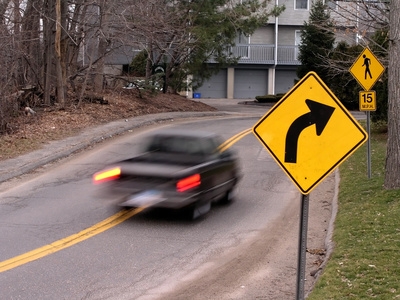
Receiving a speeding ticket is frustrating and can leave you feeling defenseless, especially if it is undeserved. Contesting your ticket may prevent you from accumulating points on your license, paying a higher insurance rate, and taking additional drivers educational training.
Treat the officer who pulls you over with respect by listening to him and suppressing the urge to interrupt. Do not insist that you were going the speed limit or plead for a second chance. There is no immediate way to prove your claims, and this will only serve to aggravate the officer.
Consider the condition of your vehicle at the time you are pulled over. A broken speedometer or failing brakes may be partially to blame for your ticket and being able to provide proof of an undetectable failure may contribute to your case. Visit a local mechanic to do a professional inspection and provide you with written evidence you can present to the judge. Even if no damage is found, a receipt for a generalized inspection is evidence that you are serious about resolving the issue and avoiding future mistakes.
Schedule a court date at your city hall within the time frame allotted for you. This date can be found on your ticket. Remember to bring this with you when scheduling a hearing.
Hire a lawyer or another experienced professional to help you. Even if you are unable to afford this, a brief consultation can familiarize you with what you may have missed in your own research. They will also provide you with a general idea of what to expect in court.
Become familiar with the location of your trial ahead of time to ensure a timely arrival. A late appearance will not only lessen your credibility but leave you frazzled and unprepared to defend your case.
Wear appropriate, modest clothing to your trial. Professional-looking attire you might wear to the workplace is best-suited for formal appearances. Avoid choosing something overly casual, dirty or potentially offensive.
Address the judge as 'Your Honor' and maintain eye contact to ensure that you do not get distracted or give an impression of insecurity. Regarding everyone with respect and courtesy is vital in earning the trust of the judge.
Let your driving record work in your favor. Even if you have many traffic offenses, you may be able to shed light on how they are unrelated to speeding or spaced far apart. Additionally, if you visited a mechanic or any other professional to assess the condition of your car, an official receipt can be presented. Your evidence should be presented to the judge in a calm and collected manner; be careful to avoid any emotionally loaded statements or complaints.
Respect the decision of the judge, keeping in mind that you have the option of making an appeal. All of your conduct may be recorded and used against you in any future trial.